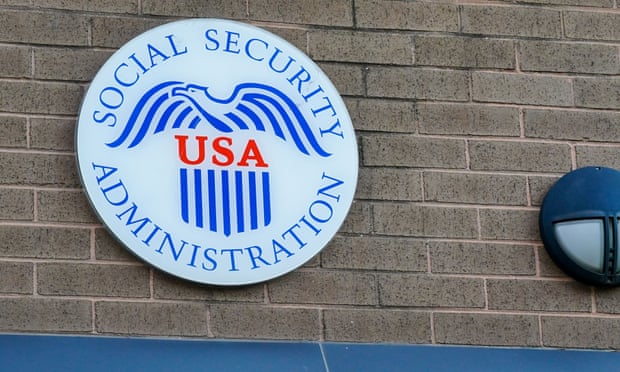‘I can’t live on $709 a month’: Americans on social security push for its expansion
Calls for reform include increasing benefits in line with cost of living as employers provide fewer retirement pensions
Nancy Reynolds, age 74, of Cape Canaveral, Florida, works as a cashier at Walmart while struggling to make ends meet on her work income and social security benefits of just $709 a month.
“I can’t live on $709 a month, so I have to work. I have no choice, even though my body says you can’t do much more,” said Reynolds.
She explained her benefits are lower due to years where an abusive husband didn’t allow her to work, and she had also taken time off to care for her father before he died . Reynolds relies on Medicare insurance, though she still has to pay co-pays for doctor visits, and receives only $19 a month in food stamp assistance.
Reynolds is one of millions of Americans who are either senior, disabled or survivors of a deceased worker, and rely on social security benefits for the majority of their income, but the average benefit of just over $1,500 a month doesn’t provide enough income to cover basic necessities.
“The government is failing all of us seniors. We have to choose whether we eat or we go to the doctor, do we eat or do we buy medicine? The struggle is out there even though I’m working,” added Reynolds. “I’m wondering how long am I going to have my home, how long am I going to be able to pay for it? Should I buy a tent now and store it, because if I lose my job, I’ll be homeless because no one wants to hire a 74-year-old.”
Approximately 65 million Americans receive a monthly social security benefit, with the majority of payments going to retired workers and their dependents.
Senior citizens and disabled Americans who rely on benefits for the majority of their income are pushing for expansion of social security. Calls for reforms include increasing benefits in line with the cost of living, as employers are providing fewer retirement pensions to workers and the US population at retirement age of 65 is expected to grow from 56 million to 78 million in 2035.
“The nation is really facing a retirement income crisis, where too many people aren’t going to be able to retire and maintain savings to live on,” said Nancy Altman, president of Social Security Works, an advocacy organization for expanding the program. “It’s a very strong system, but its benefits are extremely low by virtually any way you measure them.”
Altman argued an expansion of the program is long overdue, noting that payouts haven’t increased since 1972.
Public opinion polls on social security demonstrate there is strong bipartisan support for the system and opposition to cuts. Congressman John Larson of Connecticut introduced a bill last legislative session to expand social security, along with 209 co-sponsors, and Altman expressed optimism social security legislation could move forward after the Biden administration finalizes the bipartisan infrastructure deal.
Currently, social security benefits in the US are lower than in the majority of developed nations, compared with the percentage of earnings the benefits provide to the average worker. The benefits are also taxed and Medicare costs are deducted as well.
Susan Aubrey Wilde, 74, of Sacramento, California, lives alone in an apartment for seniors on fixed incomes, but her social security benefits of $1,122 a month barely covers little more than her rent of $794. After paying for utilities, internet, phone and the costs to upkeep and insure her car, there is little left to survive. She’s concerned that she won’t be able to afford to stay in her apartment amid rising rents.
Wilde has dental issues, but cannot afford recommended treatment, and she struggles to carry heavy loads up the two flights of stairs to her apartment. Her washing machine is currently broken and she can’t afford to fix or replace it. In 2004, she was diagnosed with breast cancer and still experiences ongoing issues from treatment. She also suffers from chronic obstructive pulmonary disease.
“I keep a tent by the door because if the rent goes any higher, I may soon be in the street. So much for retiring with dignity,” said Wilde. “I worked all my life until the cancer diagnosis. I raised two children alone on clerical wages and I did my best.”
Nearly 10 million disabled Americans and their dependents rely on social security benefits for their income. The majority of applicants for social security disability benefits are denied, with only 20-25% of applicants awarded benefits from their initial claims.
It took one year for Rocky Giammatteo, 49, of Las Vegas, to receive her disability benefits for multiple sclerosis in 2016.
“I had lost my life savings and was evicted before they finally reached a decision a year later,” said Giammateo. “If it hadn’t been for friends pitching in to help me out those last couple of months, so I could stay in a dive hotel and avoid being homeless, in Vegas’ 110-degree weather, with my poor health, I would’ve been dead.”
After she was awarded benefits and backpay, Giammateo decided to move to Mexico, where the cost of living is much lower than in the US. The benefits she receives barely covered her rent in Las Vegas.
“Moving abroad to a country with a lower cost of living was my only realistic option to survive,” concluded Giammatteo. “I’m basically a medical refugee. It’s painful, but I’m alive to tell you this tale now, so it was the right decision.”

